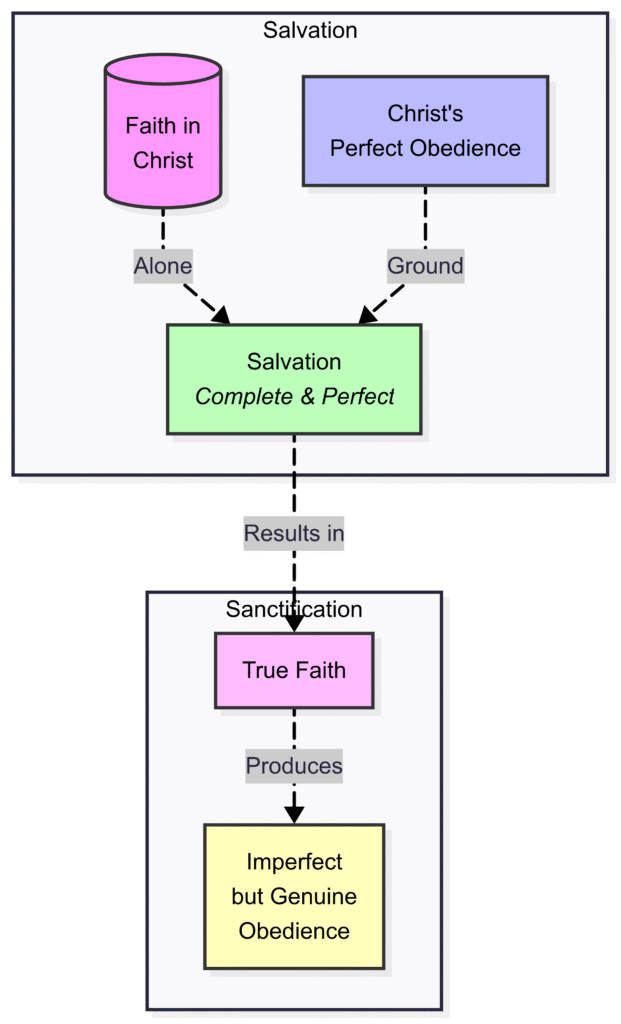If I am saved by faith alone, in Christ alone, then why does Jesus command me to ‘obey’ him?
And since I can’t obey him perfectly, what then?
Why Does Jesus Command Obedience If Salvation Comes Through Faith Alone?
The key lies in understanding that faith and obedience serve different purposes in our relationship with God. While salvation comes through faith alone, obedience flows naturally from genuine faith as the bible clearly teaches , “For as the body without the spirit is dead, so faith without works is dead also,” James 2:26
James is not arguing against salvation by faith. He is arguing against a faith that is nothing more than a verbal claim or an intellectual agreement. He’s confronting someone who says, “I have faith,” but whose life shows no evidence of that faith
James shows us with a practical example of what ‘true’ faith alone in Christ alone looks like:
“What good is it, my brothers and sisters, if someone claims to have faith but has no deeds? Can such faith save them? Suppose a brother or a sister is without clothes and daily food. If one of you says to them, ‘Go in peace; keep warm and well fed,’ but does nothing about their physical needs, what good is it? In the same way, faith by itself, if it is not accompanied by action, is dead.” (James 2:14-17)
Faith is Alive
James’s point is that a genuine, saving faith is a living thing. And if it’s alive, it will naturally produce evidence—just as a living tree naturally produces fruit.
Not About Me, Right?
Many might think there’s a contradiction here. If I am saved by faith alone in Christ alone, then is James not talking about my life as a believer in Christ but to someone else? Right?
At first glance, it might seem to contradict Paul’s teaching in verses like Ephesians 2:8-9, but it doesn’t.
Resolving the “Contradiction” with Paul
The key is to understand that Paul and James are addressing two different problems from two different angles:
- Paul (The Root of Salvation): Paul is writing against legalism—the idea that you can earn your right standing with God through your actions or by obeying the law. He is answering the question: “How is a person justified before God?” His answer is clear: By faith in Christ alone, not by works. Your works cannot save you.
- James (The Fruit of Salvation): James is writing against license or dead orthodoxy—the idea that you can claim to have faith while living a life completely unchanged by it. He is answering the question: “How can you prove that your faith is genuine?” His answer is clear: By the works that your faith produces.
They are two sides of the same coin. Think of it like this:
Paul is talking about the ROOT of the tree (Faith). James is talking about the FRUIT of the tree (Works).
You are saved by the root, not the fruit. But if the root is truly alive, it will inevitably, naturally, produce fruit. If there is no fruit, it’s a sign that the root is dead.

The diagram above illustrates several crucial points:
- The top chart shows how salvation comes through faith alone, grounded in Christ’s perfect obedience
- The bottom chart shows how this salvation naturally leads to sanctification (our growth in holiness)
- Notice that obedience appears after salvation, not as a requirement for it
- While Christ’s obedience is perfect, our obedience is imperfect but genuine
What About Imperfect Obedience?
The inability to obey perfectly touches on a profound biblical truth. According to Reformed theologians, “faith does not justify by its own essence or act because it itself is righteousness, but by its content, because it is faith in Christ, who is our righteousness” This means:
Christ’s Perfection Covers Our Imperfection
- Our salvation depends entirely on Christ’s perfect obedience, not our imperfect attempts
- As Herman Bavinck writes, “If faith justified on account of itself, the object of that faith (that is, Christ) would totally lose its value”
Growth in Obedience
- While we can’t obey perfectly, true faith leads to increasing obedience over time
- The goal isn’t achieving perfect obedience but growing in our ability to follow Christ
- Each failure reminds us of our dependence on Christ’s perfect obedience
The Purpose of Commands
- Jesus’ commands aren’t meant to achieve salvation but to guide our response to salvation
- They help us understand how to live in light of our salvation
- They reveal areas where we need to grow in trusting Christ
Practical Implications
This understanding should lead to:
- Confidence in Christ
- Your salvation is secure in Christ’s perfect obedience
- Your failures don’t threaten your salvation
- You can approach God’s commands with hope rather than fear
- Growing Trust
- Each attempt at obedience, whether successful or not, deepens your relationship with Christ
- Failures remind you of your need for Christ’s perfection
- Successes demonstrate the power of God working in you
- Freedom to Obey
- You’re free to obey without fear of losing salvation
- You can learn from mistakes without anxiety
- You can focus on pleasing God out of gratitude rather than obligation
Remember
The commands of Jesus aren’t requirements for earning salvation but rather guidance for living as someone who has been saved. Your imperfect obedience doesn’t threaten your salvation because your salvation is based entirely on Christ’s perfect obedience. When you fail (and you will), remember that Christ’s perfection covers your imperfection, and use those moments to deepen your trust in Him.

